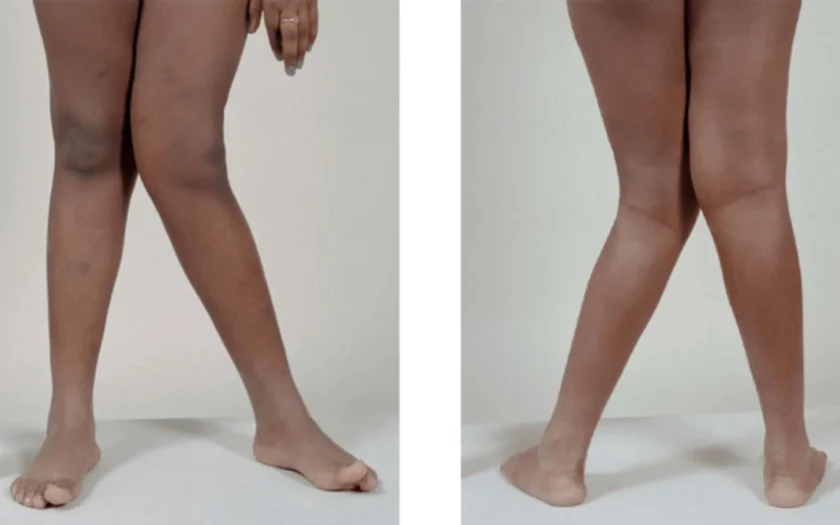Congenital hypothyroidism is a condition present at birth in which a baby’s thyroid gland does not produce enough thyroid hormone. This hormone is essential for normal growth, brain development, and metabolic processes. Without adequate thyroid hormone, the baby may experience symptoms such as jaundice, poor feeding, constipation, and a slow heart rate. If left untreated, congenital hypothyroidism can lead to intellectual disabilities and growth delays. However, when diagnosed early through newborn screening and treated with thyroid hormone replacement therapy, babies with this condition can develop normally and lead healthy lives. Early detection and consistent treatment are key to preventing long-term complications.
What Is the Thyroid?
The thyroid is a small gland located at the front of the neck, just where a bow tie would sit. It’s soft, brownish-red, and weighs less than an ounce. Shaped like a butterfly, it has two lobes, each about the size of a thumb tip. Despite its small size, the thyroid plays a powerful role in helping the body grow, produce heat, and develop properly.
What Is Hypothyroidism?
Hypothyroidism, or an underactive thyroid, occurs when the thyroid gland doesn’t produce enough thyroid hormones. These hormones are crucial for regulating the body’s metabolism. When their levels are low, the body’s energy use and cellular activity slow down. Hypothyroidism is a common condition, especially in adult women.
What Is Congenital Hypothyroidism?
Children can also have hypothyroidism. When a baby is born with this condition, it is called congenital hypothyroidism. Other children might develop hypothyroidism later in childhood or during their teenage years, often due to an autoimmune condition known as Hashimoto’s thyroiditis.
What Are the Signs & Symptoms of Congenital Hypothyroidism?
Early signs of congenital hypothyroidism in newborns include:
- Jaundice (yellowing of the skin or eyes)
- Excessive sleepiness
- Constipation
- A large soft spot on the head (fontanel)
- A large, swollen tongue
- Weak muscle tone (often referred to as “floppy”)
- Swelling around the eyes
- Poor or slow growth
- Cool, pale skin
- A large belly with a protruding navel
Without timely treatment, children with congenital hypothyroidism can face permanent intellectual disabilities, poor appetite, and breathing difficulties.
What Causes Congenital Hypothyroidism?
Most cases of congenital hypothyroidism are due to the thyroid not forming correctly during pregnancy. A baby may be born without a thyroid gland or with an underdeveloped one. In many instances, the exact cause is unknown, but some cases have a genetic basis.
In less common cases, the thyroid forms normally but cannot produce adequate thyroid hormones due to genetic issues. In such families, there’s a 1 in 4 chance that other children may also have the same thyroid problem.
How Is Congenital Hypothyroidism Diagnosed?
Early diagnosis and treatment of hypothyroidism are crucial. Newborns are routinely screened for thyroid function shortly after birth through a heel prick blood test. The blood sample is tested for:
- Low levels of T4 (thyroxine), a hormone produced by the thyroid that regulates metabolism and growth
- High levels of TSH (thyroid-stimulating hormone), produced by the pituitary gland to stimulate the thyroid
If the initial screening shows abnormal results, further blood tests and imaging studies like ultrasound or thyroid scans may be performed to confirm the diagnosis.
How Is Congenital Hypothyroidism Treated?
Children with hypothyroidism are given thyroid hormone medication to supplement what the thyroid cannot produce. Most children will need this medication for the rest of their lives.
Some infants may have temporary hypothyroidism due to factors like premature birth, maternal thyroid disease, or medications the mother took during pregnancy. This form often resolves on its own within the first few weeks or months of life.
How Can I Help My Child?
If your child has hypothyroidism, it’s essential to administer the thyroid hormone as prescribed by the doctor. For infants too young to swallow pills, crush the medication and mix it with a small amount of water, non-soy baby formula, or breast milk. Giving it at the beginning of a feeding helps ensure the baby consumes the entire dose.
Some infant formulas, especially soy-based ones, as well as certain medications and mineral supplements like calcium and iron, can interfere with the absorption of thyroid medicine. Consult your doctor about how to time these products with your child’s thyroid hormone.
What Else Should I Know?
Your doctor will regularly monitor your child’s progress to ensure the medication is effective, adjusting the dosage as your child grows. Make sure to attend all follow-up appointments.
Children with congenital hypothyroidism can sometimes experience hearing problems. If you have concerns about your child’s hearing or speech development, discuss them with your doctor.



